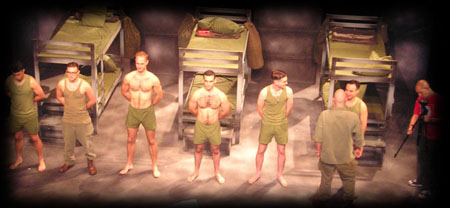| |
Gari Jones sips cautiously at his take-out coffee during the lunch break from rehearsals of his latest project, the autobiographical bitter-sweet comedy by Neil Simon, Biloxi Blues. Jones contorts his body in elastic energy as he describes the passage from page to stage of this great example of Simons's work, made famous by the film version starring Matthew Broderick. Originally written in 1985, and the middle play in the Simons trilogy of Brighton Rock Memoirs and Broadway Bound, Biloxi Blues is young, sexy and hard-hitting. It resonates with Simons's own attitudes to the militaristic posturing of the newly re-elected President Reagan. Basking in the glory of the Grenada invasion and promoting a Star Wars initiative that failed to materialise with the fall of the Iron Curtain, Reagan's America was shaken by this testosterone powered evocation of 1942 conscript life, where the loss of virginity is as vital as the training to survive a Pacific war.

The back wall of the rehearsal room at LAMDA is plastered with photocopies of contemporary wartime American advertising and propaganda. Wallowing in a lost none-PC world, in which Citizen Kane rubs shoulders with Bob Hope advertising the latest nicotine rich cigarette, and a cartoon Dick Tracy glowering alongside a nauseating image of black servitude amongst white middle class pranksters, the cuttings evoke a nation assured of its supremacy and glorying in its isolationism confronting a war in which young men are preparing to offer their bodies and souls.
Jones may be providing his actors with background material with which to ground their performances, but he is in no doubt that it certainly is not a museum piece. "This play is so present -- it is about men in any war -- its themes are timeless, universal." It is this timelessness and universality that Jones strives for in a production that teems with comedy and lust, but at the same time has an edge both disturbing and thought-provoking. Even so, Jones is determined not to produce a polemic against war, and certainly does not view this as his statement against our own politics and our own times. "I've done my bit for the political theatre, but this play is funny, with lots of different elements like dance and great period music." Jones feels he has a "duty to uphold Simons's piece of work -- a responsibility": "I don't want to alienate anyone in the audience -- I just want to tell a really good story".
Jones's own background as a director is impeccable. He modestly describes his collaboration with Harold Pinter, who has entrusted Jones with directing Sketches I & II, The Caretaker and Monologue at the Royal National Theatre, along with the Almeida productions of Celebration and The Room for their New York runs. It is this word, collaboration, which defines Jones's attitude to his work and his art. "Collaboration is about trust -- it is not about status." There is certainly no evident hierarchy in this rehearsal space. "The rehearsal room is a collaborative space -- whatever role you have in the creative process, it is valid and worthy -- I don't agree with status and hierarchy." Jones is eager to stress that this collaborative freedom extends to his talented stage management and technical team. Implicit in this whole concept of collaborative theatre is Jones's own attitude to life and to others: "You've got to enjoy working with other people."
Even at this potentially tense time, after three weeks of rehearsal interrupted by Jones's commitment to another project which opened at the Edinburgh Festival, the atmosphere is one of creative fun. "The rehearsal process for me varies from production to production -- my attitude changes with each new piece of work." Jones treats each play he directs "individually", deciding on open or closed rehearsals, length of day, whether it is "workshoppy" or "sometimes more focused." Biloxi Blues falls "somewhere in the middle -- I'm pretty relaxed as long as the work gets done." Of course, the humour of Simons's script can cause a level of hilarity amongst the seven male and two female performers which Jones finds infectious: "I'm just one of the lads really." Don't get them wrong though. They may be "very good at corpsing" during the rehearsal process, but they "all get very professional work done -- its just the comedy of the play coming through."
Asked why Biloxi Blues was chosen as a vehicle for this young dynamic company, Jones describes the conversations between himself and the producers of Couch Potato Productions, Will Norris and Alistair Sims, who by the way, also act in the play. "When I read plays I have to have strong impulses -- I either love things or hate things -- it is these strong artistic impulses that decide the play for me." Jones explains that, despite the supposition that Biloxi Blues is in some way autobiographical for Simons, there is "not much of a reality" in the piece. It is the director who "starts looking for something off the page -- at the subtexts and the reality of situations." These subtexts in turn spark stylistic ideas. "I just bombarded the producers with these ideas" and they came to the conclusion that Biloxi Blues had the potential for great entertainment.
Biloxi Blues opens at the Jerwood Vanbrugh Theatre, Malet Street , London 6-25 September 2004, and its young cast and dedicated director are set to take the place by storm. This is a play which has been crying out for revival, and the comic genius of Simons, tempered by the tragic reality of young American trainee soldiers in the Second World War, will strike a chord with young and old audiences alike. This is raunchy, sassy, sexy and very, very funny material. I am sure that Jones and his collaborative team are set for a huge success.
Kevin Quarmby © 2004
|
|
